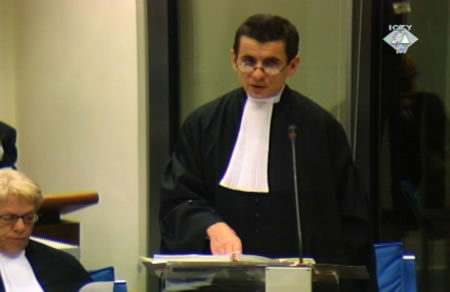Home
MILOSEVIC REFUSES TO HAVE "SECOND-CLASS ROLE"
The accused refuses to put additional questions to witnesses. In her cross-examination, Smilja Avramov points to prosecutor Geoffrey Nice's "great delusions". Why "Serbs are special"? Did "great relocation of the population and ethnic cleansing" follow the German unification ? How Ratko Mladic got disillusioned about brotherhood and unity
 Geoffrey Nice, prosecutor at the Slobodan Milosevic trial
Geoffrey Nice, prosecutor at the Slobodan Milosevic trial Slobodan Milosevic refused today to play "second-class role" at his own trial and to put some additional questions to Professor Smilja Avramov after defense counsel Steven Kay completed the examination-in-chief.
Milosevic said that Judge Robinson's question whether he wanted to ask any questions and on what topics was "pure cynicism". The presiding judge did not hesitate: he concluded that the accused’s answer was "no" and gave the floor to prosecutor Geoffrey Nice.
At the beginning of the cross-examination of the first defense witness, set to continue tomorrow, prosecutor Nice asked Smilja Avramov to list all the crises that, in her opinion, preceded the events in 1991. Avramov began with the "revolutionary changes" in 1945 and the resolution of the Cominform in 1948, moving on to the 1974 Constitution and Tito's death in 1980 and finally arriving at what she described as the "rebellion of the Siptar minority in Kosovo in 1981."
Nice noted that in her list of crises that preceded the break-up of Yugoslavia she had "omitted to mention" the abolishment of the autonomy of Kosovo and Vojvodina in 1989. Professor Avramov replied that he was "greatly mistaken" since the autonomy of Kosovo and Vojvodina "remained intact"; only certain provisions that gave the provinces "para-state elements" were rescinded. Avramov did not agree with the prosecutor's submission that Serbia thus became "more equal that the other republics" and that by controlling the votes of the provinces in the federal Presidency it was in a position to "realize its interests at the expense of the interests of others."
Avramov said in the examination-in-chief that "there is a lot of speculation about Milosevic's statement that all Serbs should live in one state". Prosecutor Nice asked the professor – stressing that he did not want to offend her – "what is it that makes Serbs so special that they have to live in the same state, disregarding the interests of other states."
Avramov denied that Serbs "ever disregarded the interests of other states”, and replied that this was a "natural right of every people," quoting the example of the German unification. When Nice remarked that the unification of Germany had not led to a "great relocation of the population and the ethnic cleansing of the minorities," Avramov replied that "there were such occurrences, but they are not much talked about."
Having given a very high opinion of Radovan Karadzic in her examination-in-chief, Avramov added in the cross examination that she held the other most wanted fugitive from the Tribunal, Ratko Mladic, in high esteem too. According to her, Mladic got disillusioned by the brotherhood and unity when a colleague of his, a Croat, his room-mate at the Military Academy, joined the Croatian forces in 1991 and "committed serious crimes."
On two occasions Professor Avramov attempted to present her "critical opinion about the Tribunal", but Judge Robinson interrupted her, saying that the "Chamber did not need to hear it."
Linked Reports
- Case : Milosevic Slobodan - "Kosovo, Croatia and Bosnia"
- 2004-09-02 BRITISH DEFENCE COUNSEL FOR MILOSEVIC
- 2004-09-02 CHAMBER DECIDES TO APPOINT COUNSEL FOR MILOSEVIC
- 2004-09-01 MILOSEVIC: “TRUTH AND JUSTICE ARE ON MY SIDE”
- 2004-09-08 EXERCISES IN FUTILITY
- 2004-09-08 KAY TO APPEAL THE APPOINTMENT OF COUNSEL INSTEAD OF MILOSEVIC
- 2004-09-09 PROSECUTOR TRIES TO IMPEACH MILOSEVIC WITNESS
